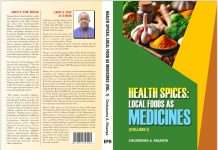
Anyone who is taking medication or any other form of health supplement needs to understand the implications of what he or she is consuming and the potential risks to ensure they are inform of any likely side effects.
Unfortunately, not everyone has an understanding of the medical terminology associated with medications, supplements and other forms of healthcare products. This is why it is so important to ask questions from your pharmacist, as they are an invaluable source of information and advice to help you make an informed decision.
Pharmacists are professionals who have been trained and educated in the handling, distributing and use of medications and pharmaceutical products. They are there to help you make the best decisions when it comes to your health and understand the body’s reaction to medications and treatments.
Here are 5 questions your pharmacist should answer:
Speaking in an exclusive interview with Pharmanewsonline, Pharm. Muna Khalil, who works at St. Nicholas Hospital, Maryland, Lagos, gave us a list of five questions every patient must ask his or her pharmacist before taking any form of medication.
These are:
What is the difference between a prescription and over-the-counter medication?
“It is especially important to ask your pharmacist the difference between a prescription and OTC medication as it can help you understand the purpose and use of a specific drug as well as its possible side effects.
“It can also help you avoid complications such as overdosing, drug interactions, and other undesirable effects. Your pharmacist can provide you with important information about the drug, such as its action, dosing schedule, possible drug interactions and contraindications,” she said.
How can I tell if a medication is right for me?
Khalil said having to take medication can be a stressful affair, especially when the side effects of taking a particular drug can be unpredictable, and their outcome largely unknown.
“It is for this reason why it is important to consult with a pharmacist before taking any medication and to be opened to their advice and guidance.
“By asking the pharmacist how to determine if a medication is right for you, they can provide accurate information on the effects of each individual drug and how it interacts with other medications or your lifestyle. This will allow you to make an informed decision on whether or not it is right for you,” Khalil said.
What should I do if I have a bad reaction to a medication?
According to her, taking medications can be a scary experience, especially if you experience an unexpected reaction. It is important to know what options to take if you find yourself in this situation. One option is to always ask your pharmacist what to do if you have a bad reaction to a medication.
“At the pharmacy, you are dealing with trained professionals who know the best course of action for you to take should you experience a bad reaction. Pharmacists understand the full details of the medications you are taking, including drug-to-drug interactions, side effects and potential risks. They can also advise you about which medications should be taken at what times and the correct dosages for those medicines.
“Asking your pharmacist about a bad reaction can also provide reassurance. Not only can they advise you on the most appropriate step to take, but they can also provide a listening ear in a time of need”, she added.
What are the signs of an overdose?
The most important thing to remember when it comes to medicine, according to Khalil is that more doses not always equal better. Taking extra doses or the wrong doses of medicine can have serious, life-threatening consequences.
“A pharmacist should always be consulted to discuss the appropriate dosage of any medicine, as well as what to do if too much has been taken. For this reason, it is important to ask your pharmacist what the signs of a drug overdose are, so you can be aware of any potential warnings that should prompt medical attention”, she stated.
She further explained that the symptoms of an overdose can vary greatly depending on the type of drug taken and other factors such as age, weight, and overall health.
“For example, an overdose of prescription opioids could cause vomiting, shallow breathing, extreme drowsiness, and even coma. An overdose of medications such as acetaminophen or ibuprofen could cause fever, confusion, bleeding and even severe liver damage.
“This is why it is so important to have a full understanding of the warning signs and seek medical help as quickly as possible if an overdose is suspected. Your pharmacist can help explain the various signs of an overdose and provide information on what to do in the event it occurs,” she said
When should I expect to see results from taking medications?
When you ask your pharmacist about the expected results of your medications, they can provide an educated estimate of when you can start seeing the effects. This can vary depending on the medication and the individual taking it.
Khalil said “Different people have different reactions to medications and some may take longer to see results than others. Asking your pharmacist can provide a baseline of when you should start seeing changes, allowing you to self-monitor and evaluate the effectiveness of the medication.
“Asking your pharmacist before taking any medications is also important to ensure that you understand any side effects that may occur. While some side effects are common and can usually be tolerated, certain medications may cause serious side effects that need to be addressed immediately. Knowing the potential side effects and when they can be expected to start will help you to recognize them immediately”.










